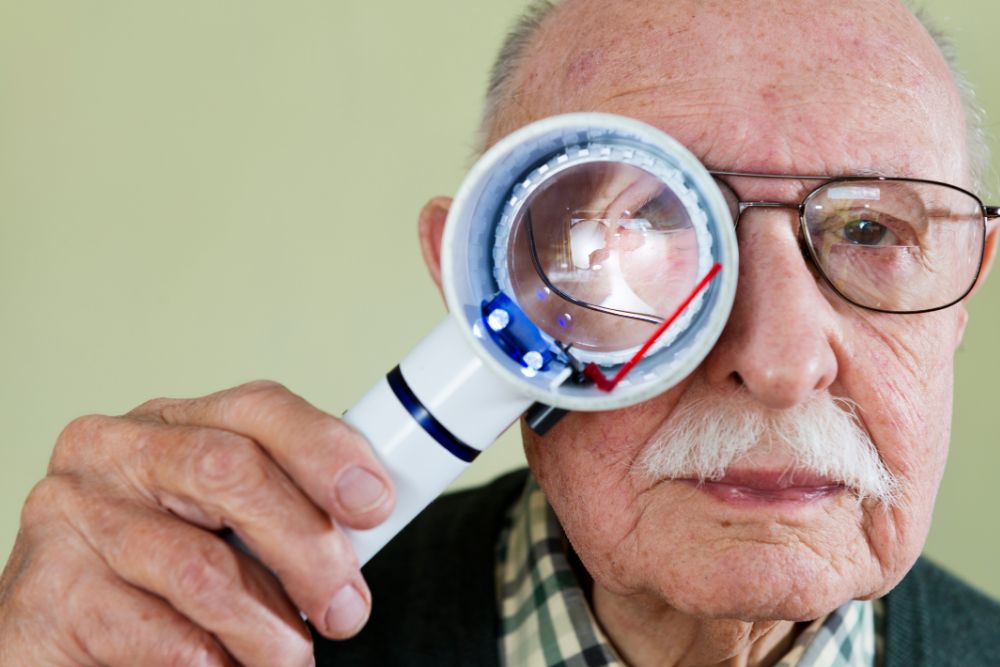What Is Macular Edema? Are You at Risk?

The macula is an oval-shaped, yellow-pigmented area in the center of the retina. The macula is responsible for sharp central vision (e.g., seeing pictures or faces, most of our color vision, and seeing fine details). When fluid seeps into the macula area and causes swelling, it’s known as macular edema. the macular tissue swells due to a condition or trauma, it is known as macular edema. There are different forms of macular edema, with a variety of risk factors. Regular, comprehensive eye exams are essential to detecting macular edema early on. The good news is that macular edema is usually treatable, enabling vision preservation.
Macular Edema, An Overview
Macular edema appears like an irregular blister of fluid; the condition typically occurs when blood vessels leak into the macula. Macular edema may result from a process called neovascularization, in which new, abnormal blood vessels grow deep within the retina. These vessels can be fragile, leaking blood and fluid into the retina from the vitreous (i.e., the clear gel that fills the eye).
As the swelling spreads and becomes thicker, it can cause visual symptoms such as distorted images, blurriness, dull or faded appearance of colors, and objects appearing wavy or appearing to vary in size when looking out of one eye at a time. Macular edema can diminish your ability to perform activities, like reading, driving, and seeing faces. If left untreated, chronic (long-term) macular edema can lead to irreversible macular damage and permanent vision loss.
Macular Edema Causes And Risk Factors
Macular edema is not a condition, but a symptom of a retinal disorder. Below are some common causes and risk factors.
Diabetic Macular Edema
The most common cause of macular edema is diabetic macular edema (DME), which is secondary to diabetic retinopathy. DME affects up to 10% of people with diabetes. The condition involves tiny bulges (i.e., microaneurysms) developing on retinal blood vessel walls and fluid or blood leakage into the macula. Symptoms include swelling, central vision problems, blindness, and permanent damage to retinal nerve cells. If you have diabetic retinopathy with or without DME, a dilated eye exam is recommended at least once a year, if not more frequently.
Other Macular Edema Causes
- Age-related macular degeneration (AMD) – There are two types of age-related macular degeneration (AMD): wet and dry. Macular edema can occur with wet AMD, which is the more serious form of the condition. Similar to diabetic retinopathy, wet AMD involves abnormal macular blood vessels leaking fluid into or under the retina.
- https://www.palmettoretina.com/Retinitis pigmentosa (RP) – RP is a rare genetic disorder, typically beginning during childhood or adolescence. The condition involves the breakdown of the retinal cells and macular swelling. Cystoid macular edema (i.e., a form of macular edema characterized by multiple cystoid areas of fluid in the macula) occurs in 10% to 50% of people with RP.
- Uveitis – Uveitic macular edema, involving fluid accumulation in the retinal layers, is a complication of acute or chronic uveitis.
- Retinal vein occlusion – Retinal vein occlusion involves blockage of small retinal veins, inhibiting normal blood drainage. The blockage causes fluid to leak into the macula.
- Vitreomacular Traction Syndrome (VMT) – VMT is a condition that causes the vitreous to shrink and pull away from the retina. VMT can cause macular holes and cystoid macular edema.
- Eye surgery – Macular edema may develop after surgery for an eye condition, like cataracts. Generally, swelling caused by eye surgery is mild, but if symptoms occur, you should still seek immediate treatment to help prevent vision loss.
- Medications – Macular edema can occur as a side effect from certain medications, like those to treat glaucoma.
Other causes of macular edema include eye tumors, trauma, and toxicity. Macular edema may also occur with no known cause.
Learn More About Macular Edema And Its Risk Factors
Macular edema is common and there are many different underlying causes. Regular, comprehensive eye exams are essential for early intervention and treatment of preventable blindness. To schedule an appointment with a retinal specialist in South Carolina, contact Palmetto Retina Center today.
